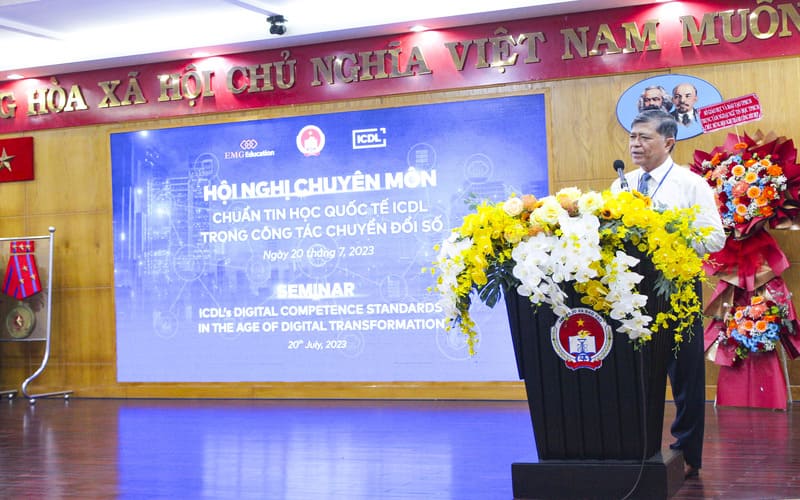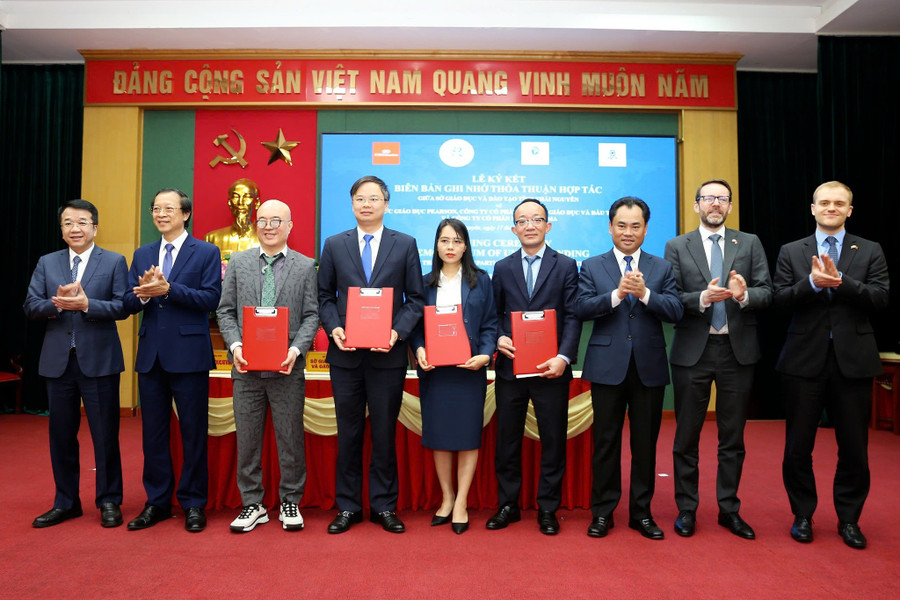In the 2023–2024 academic year, Ho Chi Minh City will further push the teaching and learning of ICT following international standards as the city focuses its resources on digital transformation and building a smart city.
On July 20, the HCMC Department of Education and Training held a conference on the ICDL international IT standards in the digital transformation efforts of the education sector.
1. Digital transformation roadmap
Speaking at the conference, Dr. Nguyễn Văn Hiếu, Director of the Ho Chi Minh City Department of Education and Training, stated that Ho Chi Minh City is concentrating all resources on building a smart city with a focus on the development of information technology and digital communication.
As a result, the role of the education sector is crucial. It is essential for teachers to fully understand the requirements and create opportunities and conditions for students to access international skill standards early and effectively.
To achieve these goals, digital transformation is one of the key tasks aimed at improving the quality of education and training, with a focus on enhancing digital skills and competencies of the workforce.

"The education sector must consistently pursue the goal of digital transformation with a clear learning roadmap during the implementation of the general education program. By 2030, the city aims to integrate all components of the education system into the digital environment," emphasized the head of the education department.
According to Mr. Hiếu, teaching and learning computer science in schools based on international standards, including the ICDL standard from grade 1 to grade 12, is essential and holds significant importance.
The use of international digital competency standards helps standardize learners' IT skills, offering numerous benefits to students and enabling the future workforce to confidently compete in the context of globalization.
Additionally, teacher training must be enhanced to build a team of computer science educators with a solid foundation in digital technology, effectively guiding students so that both teachers and students become key contributors to the digital transformation process.

2. The necessity of standardizing digital competency
At the conference, Mr. Damien O’Sullivan, CEO of ICDL Global, also shared that countries are increasingly recognizing the importance of standardizing digital competencies through specific, clear frameworks, with measurable outcomes such as competency certificates. The long-term goal for the education sector related to digital transformation is to introduce initiatives and programs to enhance digital skills for students and the unemployed workforce.
According to Mr. Damien O’Sullivan, educational institutions should establish digital competency standards to become an integral part of the curriculum across all subjects and industries.
As a leading organization in the field of digital competency standardization, recognized by many countries around the world, the CEO of ICDL Global affirmed the commitment to developing advanced and suitable educational solutions. This includes curriculum programs, digital competency certification, teaching and assessment platforms (using technology), as well as other professional support forms through training and system development. This is aimed at helping countries successfully achieve their digital transformation goals and build a highly competitive workforce for the 21st century.
More Than 100 Schools Implement the ICDL International IT Standard
As one of the schools implementing this IT standard, Mr. Nguyễn Vi Tường Thụy, Principal of Nguyễn Văn Tố Secondary School (District 10), reported that in the recent IT certification exam, 844 out of 851 students received the certificate. This is a very positive result, showing the readiness and ability of Vietnamese students to meet international standards. The Principal of Nguyễn Văn Tố Secondary School believes that three important factors when implementing the international IT standard are people, infrastructure, and the support of parents. At Nguyễn Văn Tố Secondary School, during the initial implementation phase, the infrastructure and equipment conditions were not sufficient to meet the requirement of teaching IT three class periods per week. The school adopted a flexible solution by engaging in socialization efforts, mobilizing philanthropists to invest, with the commitment that students would have access to equipment from grade 6 to grade 9. Thanks to this effort, the implementation proceeded smoothly with high parental approval. |
Source Thanh Niên News








